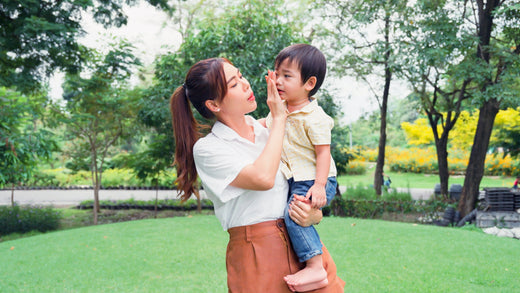
Baby fever refers to an elevated body temperature in babies, typically resulting from an underlying condition. While the fever by itself is not an illness, it often indicates that the baby's immune system is actively responding to an infection or other health issue. Common causes of fever in babies include viral and bacterial infections, teething, immunisations, and environmental factors2 7.
How to bring down baby fever? Baby fever may be a sign that your child is fighting an illness. But it is also a sign that they are building an immunity towards it. While most concerns of baby fever resolve on their own, it’s always best to consult your paediatrician. Learn more about the following in this article:

Childhood illnesses such as colds, coughs, and fevers are common, but as a parent, looking after a baby who is sick for the first time can be stressful. You may have questions such as “How to bring down baby fever?” or “What are some safe baby fever remedies?” Fret not; we are here to help with tips for looking after your child when they’re down with baby fever.

How to Bring Down Baby Fever and Take Care of a Sick Baby
1. Check in With Your Doctor Regularly
If you are concerned about any symptoms your child is presenting, especially baby fever, you should call your doctor immediately. A temperature reading of 38.0°C (100.4°F)1 or higher usually suggests that your baby has a fever. But readings can vary depending on the type of thermometer you use, and which part of the body the readings are taken at.
For babies over six months of age and young children, call your doctor when they have a temperature of 39.0°C (102.2°F) or more2. Feel free to ask your doctor for more advice and tips on how to bring down baby fever.
A baby fever is many times the symptom of a common illness such as a cold (infection of the upper respiratory tract). Colds will normally last for around one week (but can stretch for up to two weeks) and are typically not treated with medication. However, your paediatrician can recommend suitable baby fever remedies such as over-the-counter medications that may be effective in bringing down a fever3. A little extra care, rest, and attention should help your baby make a full recovery within a few days. Your doctor will be able to guide you on how to nurse your baby back to health.
2. Monitor Your Baby’s Temperature Regularly
How to bring down baby fever? Your doctor should be the first person to call if you are in doubt about whether any sign or symptom of the illness needs further investigation.
Regularly monitoring your baby’s temperature will help you determine how your baby is responding, stay informed of their health and if you need to call the doctor.8 There are many ways to use a digital thermometer. Placing it under your baby’s armpit, putting it in the ear or inserting it into the rectum are some of the ways. Check with your doctor to see what will produce the most accurate results9.
3. Keep Your Baby Comfortable
The hardest part of looking after a sick baby is that they cannot tell you how they’re feeling or what they need. There are some signs to indicate that your child may be unwell, though, of course, these can differ for every child.
Your baby may be restless, cry more, or go off their feeds. In such cases, knowing how to bring down baby fever and console a sick baby can be invaluable. Comfort can come in the form of keeping your baby close to you or letting them sleep in a well-ventilated room to regulate their temperature. If your child has diarrhoea, it can mean changing diapers more regularly and using a barrier cream on their diaper area4 to try and ease any soreness that may have been caused by more frequent pooping.
4. Keep Your Baby Hydrated
While a common sign of sickness may be a loss of appetite, it is very important to make sure that your baby is getting enough fluids. If your baby has diarrhoea or congestion from a cold, they may be at risk of becoming dehydrated. Contact your doctor if you’re worried about the fluid intake. They will also guide you on how to bring down baby fever.
Signs of baby dehydration may include less pee in your baby’s diaper, or dry, pale lips5.
5. Take Care of Yourself and Stay Calm
While how to reduce baby temperature and fever will almost certainly be the focus of your attention, it is really important that you look after yourself. Caring for a baby is exhausting enough. And when sickness is involved, parenting can be even more challenging. Sleepless nights or broken sleep due to your baby’s restlessness, fewer naps in the day, and general worry about whether you are doing the right things will all impact how you feel.
Make sure to make time for yourself – even if it’s just having a nice bath before bed or eating a nutritious meal cooked by your partner. Do not forget to call on extra support from friends and family while your baby’s sick. Ask them to pop to the store for some groceries or keep you company and help with some chores around the house. Every pair of extra hands will help to lighten the load!
Of course, if panic sets in because your child seems to be displaying any worrying symptoms, try to stay calm. Make a call to emergency services, and stay with your child until you are instructed on what to do next.
Hello moms! Are you seeking additional tips on baby care? Join the Enfamama A+ Club and gain access to free advice, promotions, and more from our supportive community.
Want to learn more about how to bring down baby fever? Check out the three most commonly asked questions by parents.
1. Aside from infection, what are the other causes of baby fever?
Fever is usually a sign that your child’s immunity is fighting off an infection. But there are other reasons why they may have a high temperature. This includes teething, response to vaccination, being in a warm environment, and being overdressed.2
2. How to take a child’s temperature if they have high baby fever?
If you want to know how to bring down baby fever, you must first know your baby’s temperature. When it comes to temperature readings for baby fever in toddlers, use a digital thermometer to take a rectal temperature. For older children, you may use a digital thermometer to take an oral temperature. Placing a thermometer in their armpit is also acceptable but may be less accurate. Consult your paediatrician for the most appropriate method. 2
3. What is the best medicine for baby fever?
If your child has a fever and is feeling uncomfortable, acetaminophen or ibuprofen can be administered as per the recommendation of your doctor for proper advice and dosage.6
Related articles:
-
Child Immunity: How to Minimize Sick Days and Bounce Back from Illness
-
Immunity Booster Activities: How to Improve Your Child's Immunity
Expert Resource:
Dr Veena Angle
MBBS, MD Microbiology (India)
References:
- Babies: How can you tell if your baby is ill? Retrieved Aug 29, 2023 from https://www.aboutkidshealth.ca/Article?contentid=710&language=English.
- Fever (High Temperature) in Kids. Retrieved August 29, 2023 from https://kidshealth.org/en/parents/fever.html.
- Fever treatment: Quick guide to treating a fever. Retrieved September 11, 2023 from https://www.mayoclinic.org/diseases-conditions/fever/in-depth/fever/art-20050997#:~:text=Give%20your%20child%20acetaminophen%20(Tylenol,to%20an%20infant%20or%20toddler.
- Carr, Andrew N et al. “Diaper dermatitis prevalence and severity: Global perspective on the impact of caregiver behavior.” Pediatric dermatology vol. 37,1 (2020): 130-136. doi:10.1111/pde.14047. Retrieved September 22, 2023, from https://www.ncbi.nlm.nih.gov/pmc/articles/PMC7027557.
- Signs of dehydration in Infants & Children. Retrieved August 29, 2023 from https://www.healthychildren.org/English/health-issues/injuries-emergencies/Pages/Dehydration.aspx.
- Coughs and Colds: Medicines or Home Remedies. Retrieved August 29, 2023 from https://www.healthychildren.org/English/health-issues/conditions/chest-lungs/Pages/Coughs-and-Colds-Medicines-or-Home-Remedies.aspx?_ga=2.15022198.1390381077.1687785503-1868067554.1687785503&_gl=1*svd7zp*_ga*MTg2ODA2NzU1NC4xNjg3Nzg1NTAz.
- What to know about fever in babies. Retrieved September 22, 2023, https://www.medicalnewstoday.com/articles/324660#diagnosis.
- Fever: When to call the paediatrician. 12/2/22. American Academy of Paediatricians. Healthychildren.org. https://www.healthychildren.org/English/health-issues/conditions/fever/Pages/When-to-Call-the-Pediatrician.aspx#:~:text=Also%20call%20your%20child%27s%20doctor%20if%3A&text=Your%20child%20seems%20to%20be,years%20of%20age%20or%20older.
- Fever in Infants and Children. MSD Manual - Consumer Version. Children’s Health Issues. Nov 2022. https://www.msdmanuals.com/en-in/home/children-s-health-issues/symptoms-in-infants-and-children/fever-in-infants-and-children.




